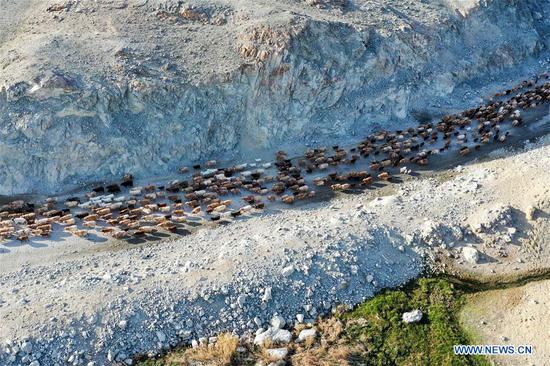The Ministry of Agriculture and Rural Affairs is seeking public opinion on a revised list of edible animal species in the latest effort to distinguish between livestock and wildlife.
The move came after the Standing Committee of the National People's Congress decided in February to crack down on the illegal consumption of wildlife.
In a circular posted on its website recently, the ministry said it had drafted a new version of the National Catalog of Livestock and Poultry Genetic Resources in light of the NPC Standing Committee's decision.
It is welcoming public feedback on the draft, including proposed changes, until May 8.
The draft catalog lists 18 traditional livestock and poultry species (including pigs, cattle, chickens and ducks) and 13 special species, whose breeding and consumption would be subject to anti-epidemic and other rules prescribed in the country's Livestock Law.
One special species on the existing list, rabbits, has been moved to the traditional species list in the draft catalog.
Most of the animals labeled as "special species" in the new list-including ostriches, silver foxes and minks-were not included in the previous version of the catalog, even though they have been domesticated and bred for decades and are central to extensive industry chains.
In a policy interpretation, the ministry said the revision is an important step in carrying out the NPC Standing Committee's resolution, which aims to ban the consumption of nearly all wild animals falling outside the list, including the wild relatives of cataloged species.
China used to allow consumption of non-cataloged wildlife as long as the animals were raised in farms with government approval.
Gan Yuanchun, a lawyer and an adviser to the Hunan Cuisine Industry Promotion Committee, said the new rules were very strict because they did not exempt some domesticated species.
"In practice, it's really hard for watchdogs to discern wild species and their domesticated relatives," he said.
In another policy interpretation, the ministry said dogs were not added to the new list as they are essential human companions, and it is a common global practice and a sign of civilization not to treat dogs as livestock.
However, an unnamed ministry official told ThePaper.com, an online news outlet, this does not mean the consumption of dog meat will be banned.
That's because the ministry says there are two types of animals not included on the list: wild animals and their relatives in captivity, which are governed by wildlife protection laws and the NPC's ban on wildlife consumption; and pets, which are neither wildlife nor livestock-with extra laws needed to determine their edibility.
Though widely consumed in border regions in Northeast China and the south, dogs have never been included in the catalog due to management difficulties and sensitivities related to dog meat consumption.
Neither the draft catalog nor the existing one includes bamboo rats, one species suspected of being an intermediary host for the novel coronavirus.
Some local authorities have promoted the breeding of the rodent for consumption in the mountainous regions in South China to boost farmer's incomes.
Gan said that, given the economic importance of bamboo rats, there was still hope for minor modifications to the draft that could save them from being banned for good.


















































